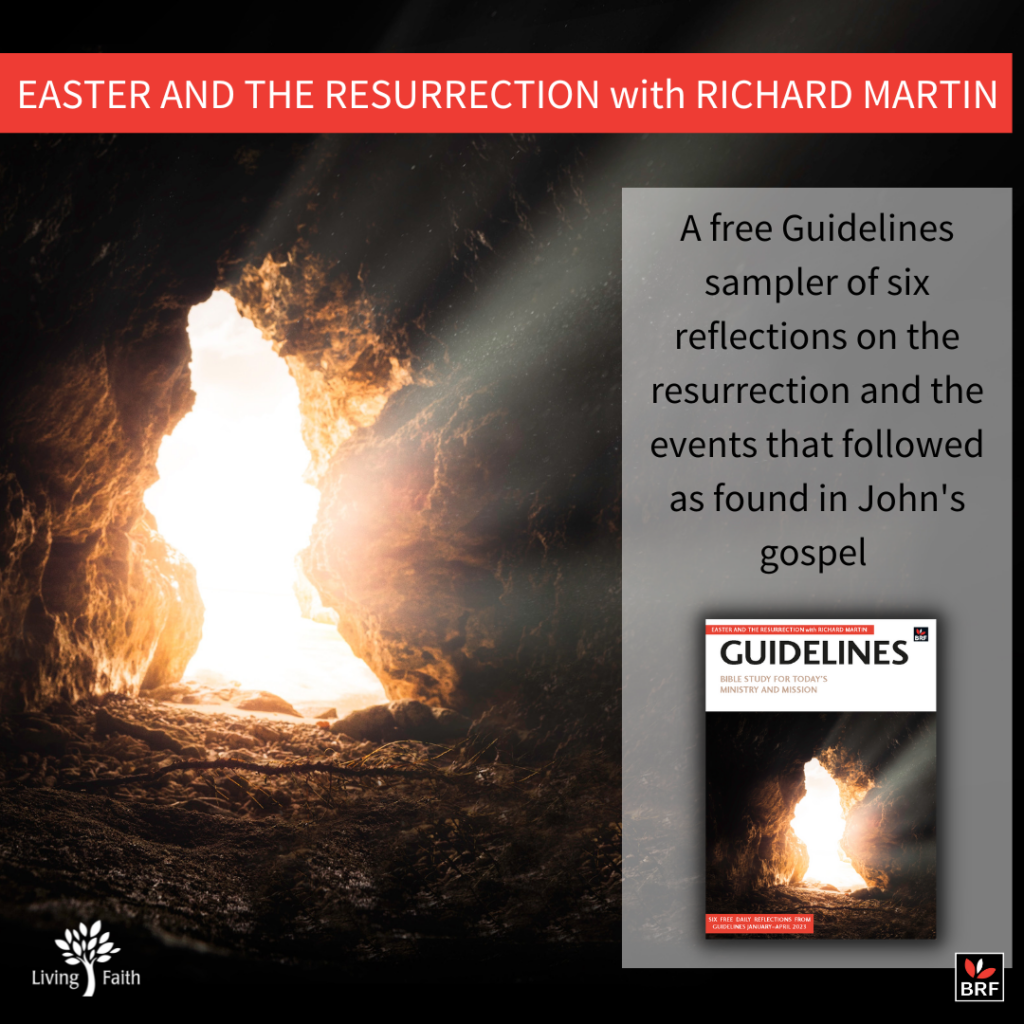In this edited extract from his series of reflections in Guidelines January–April 2023, Richard Martin examines Easter as described in John’s gospel, and sees parallels with Matthew’s beatitudes.
9 April 2023
Jesus risen in humility
Good day to you wherever you are on this joyful day! As Augustine said, ‘We are an Easter people and Alleluia is our song.’ Not just today, of course – the resurrection defines our whole faith in Christ: ‘If Christ has not been raised, then our preaching is in vain and your faith is in vain’ (1 Corinthians 15:14, RSV).
I’d like to suggest to you that what we celebrate today is the assurance that Christ-like virtues will in the end overcome violence, the abuse of power and the silencing of uncomfortable voices.
As I have looked at the Easter narrative in John 20—21 for the current edition of Guidelines, I’ve been struck how closely they mirror the beatitudes from Matthew 5. In these two final chapters of his gospel, the apostle John shows us that the risen Jesus is just the same in character as was the earthly Jesus – there is absolute continuity. It is Jesus who is risen – he has not suddenly changed into an imperialist.
‘What we celebrate today is the assurance that Christ-like virtues will in the end overcome violence, the abuse of power and the silencing of uncomfortable voices.’
The beatitudes are lived out in his resurrection appearances just as fully as they were in his earthly ministry.
When Jesus saw the crowds, he went up the mountain, and after he sat down, his disciples came to him. And he began to speak and taught them, saying:
‘Blessed are the poor in spirit,
for theirs is the kingdom of heaven.
Blessed are those who mourn,
for they will be comforted.
Blessed are the meek,
for they will inherit the earth.
Blessed are those who hunger and thirst for righteousness,
for they will be filled.
Blessed are the merciful,
for they will receive mercy.
Blessed are the pure in heart,
for they will see God.
Blessed are the peacemakers,
for they will be called children of God.
Blessed are those who are persecuted for the sake of righteousness,
for theirs is the kingdom of heaven.Blessed are you when people revile you and persecute you and utter all kinds of evil against you falsely on my account. Rejoice and be glad, for your reward is great in heaven, for in the same way they persecuted the prophets who were before you.’
Matthew 5:1–11 (NRSV)
A telling detail
There’s a little detail in John’s first Easter Day story that fascinates me. We are told that Peter and John visit the tomb following Mary’s announcement that the body has gone (John 20:2). The beloved disciple (I will assume it is John) gets there first, sees the linen cloths that had wrapped Jesus’ corpse lying on the ground inside, but stays outside. Peter then arrives. He goes into the tomb and sees the same cloths. He also notices the head cloth in a separate place, ‘rolled up’ (or ‘folded up’, ESV) by itself. John then goes into the tomb too, and John ‘saw and he believed’.
What was it, I wonder, that John saw which caused this sudden leap of faith? Could it have been the folded head cloth, which Peter perhaps pointed out to him? John had shared pretty basic accommodation with Jesus for up to three years. He would know his early morning habits. And I’m guessing that John sees that head cloth and says to himself – that’s Jesus! Only he tidies up as carefully as that, only Jesus folds up his clothes like that. He must have done this – he must be alive!
‘What was it, I wonder, that John saw which caused this sudden leap of faith? Could it have been the folded head cloth, which Peter perhaps pointed out to him?’
More parallels…
If I’m right about Jesus folding up his head cloth in the tomb (John 20:7–8), he’s an example of someone who’s poor in spirit receiving the kingdom.
Then there’s Mary Magdalene, a mourner who is comforted (20:11–18).
The disciples, at first scared and locked in but then anointed and sent out, are like the meek who inherit the earth (20:19–22). Their ministry is one of forgiveness (20:23); they are the merciful, who obtain mercy.
Then there’s Thomas, who so wants to believe but can’t for a long, lonely week (20:24–29). He is one who hungers and thirsts for righteousness and is in the end satisfied, a model for all who search sincerely (20:30–31).
The disciples out fishing, just doing simple ordinary things but who in the course of their work meet Jesus (John 21:1–14): they are those who are pure in heart, and see God.
In his restoration and commissioning as shepherd, Peter becomes a peacemaker who knows he is a son of God (21:15–17)
And in the prophecy of his death (21:18–19), Peter will become one who is blessed when he is ‘persecuted for righteousness’ sake, for theirs is the kingdom of heaven’.
Okay, I might have stretched the point a bit in a few of those, but overall I think the resonances are clear, and remarkable. What they suggest to me is that it is Jesus who has been raised – he is still the humble servant figure that he was before, teaching and modelling God’s way of life.
And as he is raised from death, so he gives us hope that continuing his ways, and not giving in to temptations to assert power or to silence the underdog, is where we will experience the coming of his kingdom.
‘It is Jesus who has been raised – he is still the humble servant figure that he was before.’
Remarkable resonances
You might be able to think of examples of this happening. Here are three that stick in my mind:
- Do you remember when Nelson Mandela was released from prison? That humble, gently gracious man, emerging from the tomb of gaol, to lead the way to the ending of apartheid.
- I think of people in workplaces I have known, bullied by managers and inspectors, but eventually proving their worth to them by their dedication and quiet professionalism.
- And I think of churches I have known, poor in resources and numbers but serving God and their neighbour faithfully year after year, resisting the voices that call them a drain on central finances, becoming centres of hope and friendship during the pandemic and now providing warm spaces.
The Easter life portrayed by John is, I’m suggesting, both then and now, the life of the beatitudes, now able to be faithfully practised in unquenchable hope. In living the way of the beatitudes we live the life of the kingdom. It’s these virtues that make God’s ‘Alleluia’ people distinctive.
Well, that’s how I see it! Happy Easter!

Richard Martin served with Church Army before ordination to a curacy and an incumbency in Gravesend. He is now priest-in-charge of three parishes in the Gloucester diocese and is a Third Order Franciscan.

If you would like to read Richard’s Guidelines reflections, ‘Easter in John’s gospel: Jesus risen in humility’, you can download it for free.
